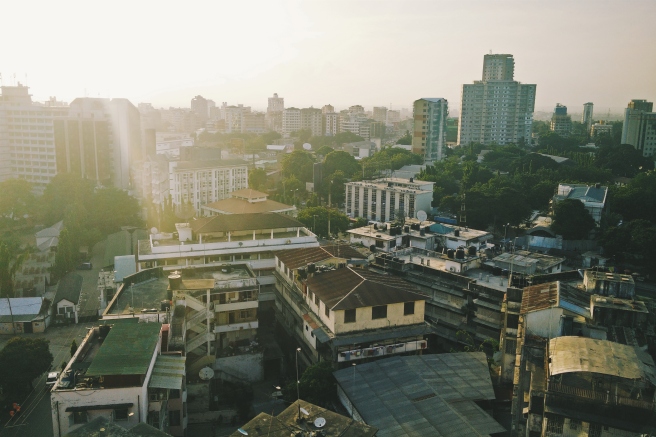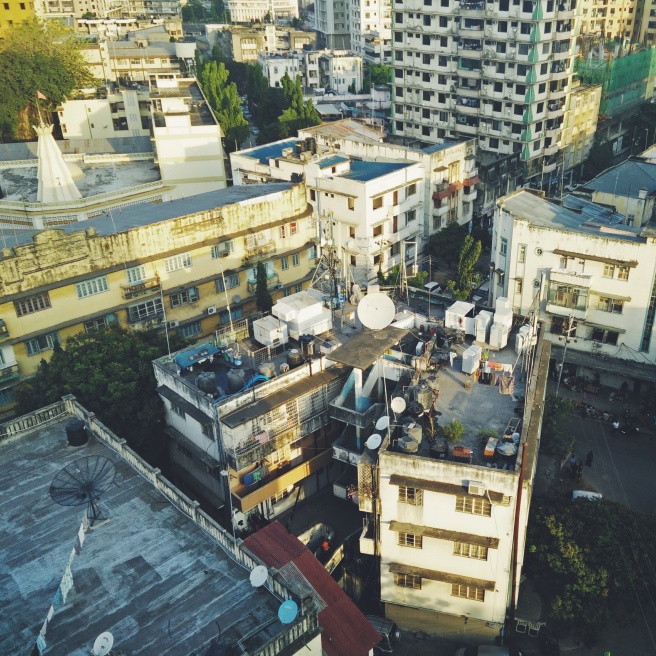An invisible line became visible shortly after I came to Tanzania. That line has been there my entire life, but I’ve always been so detached from it that I haven’t noticed its presence.
Until now.
This line is the reason I haven’t been blogging as much since coming here. The line is the reason my Instagram photos have been primarily taken from rooftops, from private beaches, and from places where I’m surrounded by lots of people I know.

It’s the line between safety and danger, which, for the purpose of this post, will be classified as anything causing bodily or lasting psychological harm. Lately, I’ve been walking this line like a tightrope, trying to find the balance between protecting myself and my belongings and still living a semblance of the life I’m used to.
Internally, I struggle with my own description of a single line. Because it divides the world in two – into black and white, good and evil, two concrete categories split by an opaque, 20 foot high wall. I know there is a grey area. I know this is a spectrum. That’s acknowledged and let’s move on.
Since coming to Tanzania the issue of personal safety has taken over my thoughts. My Google Docs folder and notebook are full of half-written blog posts on this topic. But I fear they have all sounded too angry, too spiteful, too worried.
I’m going to reference the podcast Serial here (season two is out now and I am so hooked already). In the first episode, host Sarah Koenig references the kid’s book, Zoom. The first page is an image of two red cones, then the scope zooms out to reveal one scene, and then another, and so on and so forth, until you realize those two red cones are part of a much larger scene, a much larger system.
My version of Zoom – or I should call it our version of Zoom since it has affected a number of my coworkers as well as myself – starts with two individual incidents.
The first involved my female co-worker having her bag hooked by a car mirror. She was then dragged behind the car for several metres until she was able to untangle herself. The second incident involved two of my co-workers, male and female, who experienced an aggravated assault while on the beach near their house.
We spent a number of days dwelling on each of these incidents, picking apart the most minute details of what had gone wrong, what they could have done differently. Though it was difficult, we tried to alleviate feelings of blame.
Over the coming weeks my mind attempted to zoom out, and I tried to put these highly personal, individual incidents into context. Into context with the Westerner experience in Tanzania, into context with the experience of women in general, into context with the role internal (police corruption) and external (colonialism) forces may have played. I didn’t realize that by zooming out I was also dwelling, spiralling. I dug a hole where all I could think of was my personal safety and the limitations put on it.
I feel so dirty and guilty and privileged writing this post. This is perhaps the greatest reason I have not said anything about this to-date. I have told myself again and again that I am so fortunate to live the life I live. But this is still my reality and it is still scary based on the circumstances in which I was raised, so I need to get these thoughts out there.
Another reason I have hesitated to write about this publicly is because it reinforces a narrative of Tanzania, of “AFRICA” that I don’t like. It reinforces stereotypes of violence, of anger, of a lack of control. It is fuel for everyone who has ever uttered a racial slur against the diverse group that is “black people.”
I came here wanting to write about the culture of Tanzania, the beautiful moments in everyday life, the people behind and beyond those negative stereotypes. And I still want to do this.
But I realize that my desire to write about those positive stories shrouds the reality of everyday.
Which is this: bad things happen to people all the time. And it’s not just white people – it’s everyone. And this is a lot of people’s reality, day in and day out. It’s fucked up.
***
Feeling unsafe bears a heavy weight. Just as that line of personal safety is an invisible one, so too is this unseen pressure. It’s the unspoken rule that it is not safe for me to go out after dark, that I will be targeted based on my skin colour alone. It’s the assumption that I am wealthy, that I am promiscuous, simply because of what I look like.
One day I was lying in bed watching the Sex in the City movie. I don’t watch a lot of movies or TV, but when I do it is because I need some sort of escape. My latest dystopian novel couldn’t offer a fluffy enough alt-life, so I retreated into the realm of my roommate’s external hard drive and came up with Carrie.
As the movie ended, I thought of all the freedoms those women in New York had – waltzing around the city at night in their high heels and designer dresses. I thought of all the times in Ottawa I have walked alone at night, with my laptop, iPhone, money in my wallet.
I always felt safe, but I never thought about it until I got here. I realize how much I hate feeling as though I can never leave my Rapunzel’s Tower of an apartment.
I looked out my window at the silent road below, and felt the crushing feeling of being trapped.
I’m not the best travelled person in this world, but I have been put in circumstances that could be perceived as dangerous in several countries. I have never, with the exception of a few minor incidents, felt unsafe. The weight in which I feel that in Tanzania is worth noting.


***
The other week my roommate Alex and I were biking along Barack Obama Drive, a lovely bit of oceanside road that follows the city edge to Kivukoni, the local ferry port. It was beautiful, but it was also sad, in a way. I knew I would likely never be able to share this view with those back home. How many places on Earth bear that same burden? Beauty, without the ability to share.
Reflecting on this later, I realized the real tragedy is that this is a mere aesthetic inconvenience for me, but the everyday reality for millions.
Fear is the mightiest of prohibitors and I feel bullied into submission, teetering on the edge of that fine line.
***
I need your help. I usually try to neatly wrap up my blog posts with a “the moral to the story is…” but I’m at a loss. I feel disempowered and small. I feel angry and guilty. I am still eager to explore and to learn but at the same time I feel there is a dent in my armour that needs a little TLC.
Have you ever felt like this when you’ve travelled? What have you done in these situations?


Merry Christmas Hilary! I enjoyed your post, very articulate and heartfelt. As you say, not sure there is a moral to your story. I think being grateful for your many gifts (liberties) and respectful of others’ circumstances will help keep you safe. There are no guarantees but you have a lot of resources and common sense. Travel safely and enjoy! Rita